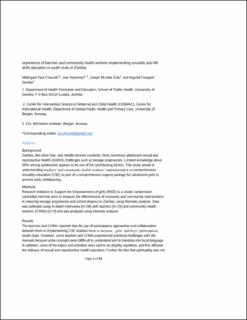Experiences of teachers and community health workers implementing sexuality and life skills education in youth clubs in Zambia
Journal article, Peer reviewed
Accepted version
Permanent lenke
https://hdl.handle.net/11250/2988640Utgivelsesdato
2021Metadata
Vis full innførselSamlinger
Sammendrag
Zambia, like other low- and middle-income countries, faces numerous adolescent sexual and reproductive health challenges such as teenage pregnancies. This study aimed at understanding teachers' and community health workers' (CHWs) implementation of comprehensive sexuality education (CSE) as part of a comprehensive support package for adolescent girls to prevent early childbearing. Data collected using in-depth interviews [n = 28] with teachers [n = 15] and community health workers [n = 13] were analysed using thematic analysis. The teachers and CHWs reported that the use of participatory approaches and collaboration between them in implementing CSE enabled them to increase girls' and boys' participation youth clubs. However, some teachers and CHWs experienced practical challenges with the manuals because some concepts were difficult to understand and translate into local language. The participants perceived that the youth club increased knowledge on CSE, assertiveness and self-esteem among the learners. Training and providing a detailed teaching manual with participatory approaches for delivering CSE, and collaborative teaching enabled teachers and CHWs to easily communicate sensitive SRH topics to the learners. However, for the adoption of CSE to be even more successful, piloting of the curriculum with local facilitators and translating the manuals into the local languages before they are implemented, is recommended.
